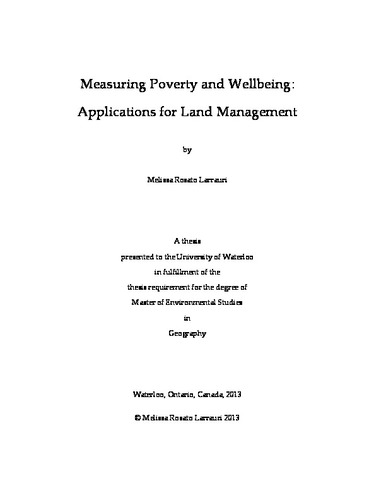| dc.contributor.author | Rosato Larrauri, Melissa | |
| dc.date.accessioned | 2013-02-22 19:39:36 (GMT) | |
| dc.date.available | 2013-02-22 19:39:36 (GMT) | |
| dc.date.issued | 2013-02-22T19:39:36Z | |
| dc.date.submitted | 2013 | |
| dc.identifier.uri | http://hdl.handle.net/10012/7369 | |
| dc.description.abstract | Poverty reduction and conservation can seem contradictory as integrated goals. Despite mixed results over the past several decades, both goals are increasingly being sought out together in practice. Using a case study of an integrated conservation and development project in the Azua province of the Dominican Republic, this thesis examines the definitions and measurement of poverty and wellbeing within integrated conservation and development initiatives. It asks whether the inclusion of subjective ideas and participatory approaches may present new opportunities to better integrate poverty measurements within natural resource initiatives. Four focus groups and 250 questionnaires formed the core methods for data collection. The study reveals wellbeing as a concept was better able to capture the multi-faceted nature of capabilities poverty. Wellbeing often engages with the themes of vulnerability and inequity and includes politically-sensitive considerations instead of concepts that are about assets or consumption, ideas based in the outdated income-poverty perspective. Locally developed indicators were best able to reveal nuances related to context that universal poverty indicators would miss or misrepresent. The results also found that the way poverty, wellbeing, problems and solutions are conceptually framed and defined can be highly relevant. Using asset-based concepts and metrics would lead to economic development goals whereas rights-based ideas would promote very different objectives and methods. The comprehensive identification and targeting of stakeholders was found to be a necessary focus in determining the priorities. Participatory processes, especially with a commitment to power devolution, can help ensure that an array of local ideas are accounted for, and contribute to, a nuanced understanding of complex phenomena. Overall, subscribing to a rights-based approach that targets the means (opportunities) of development and not the ends (assets) can facilitate the needed shift towards the new poverty paradigm, in both concept and practice. A more successful integration between poverty reduction and conservation will require such a shift. | en |
| dc.language.iso | en | en |
| dc.publisher | University of Waterloo | en |
| dc.subject | Poverty | en |
| dc.subject | Wellbeing | en |
| dc.subject | Dominican Republic | en |
| dc.subject | Sustainable Land Management | en |
| dc.title | Measuring Poverty and Wellbeing: Applications for Land Management | en |
| dc.type | Master Thesis | en |
| dc.pending | false | en |
| dc.subject.program | Geography | en |
| uws-etd.degree.department | Geography | en |
| uws-etd.degree | Master of Environmental Studies | en |
| uws.typeOfResource | Text | en |
| uws.peerReviewStatus | Unreviewed | en |
| uws.scholarLevel | Graduate | en |

